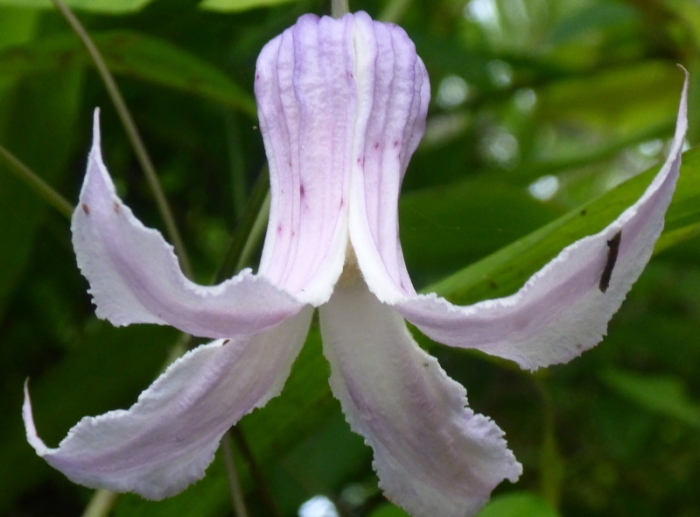Swamp Leather Flower
(Clematis crispa)
Swamp Leather Flower (Clematis crispa)
/
/

mfeaver
CC BY 4.0
Image By:
mfeaver
Recorded By:
Copyright:
CC BY 4.0
Copyright Notice:
Photo by: mfeaver | License Type: CC BY 4.0 | License URL: http://creativecommons.org/licenses/by/4.0/ | Rights Holder: mfeaver | Publisher: iNaturalist | Date Created: 2019-05-04T10:40:13-07:00 |


































































Estimated Native Range
Summary
Clematis crispa, commonly known as Swamp Leather Flower, is a deciduous perennial vine native to wetlands, swamp margins, and lowland woods in the Southeastern United States. It typically climbs to heights of 6-10 feet (1.8-3 meters) with a spread of 3-6 feet (0.9-1.8 meters). The plant features nodding, bell-shaped flowers with recurved sepals that are usually lavender to pale blue, occasionally with a pinkish hue, and bloom from late spring to early summer. The flowers are quite showy and attract pollinators such as bees and butterflies.
Swamp Leather Flower is valued for its unique, attractive flowers and its ability to thrive in moist conditions, making it a suitable choice for rain gardens, water edges, and naturalized areas. It can also be trained on trellises, arbors, or fences in garden settings. This Clematis species requires consistently moist soil and benefits from mulching to retain soil moisture. It prefers a location with full sun to part shade and soil that is rich in organic matter with good drainage. While it is relatively low maintenance, it can be susceptible to Clematis wilt, a fungal disease that causes sudden wilting and death of stems. To prevent this, ensure good air circulation and avoid overhead watering. It is also important to note that all parts of the plant are toxic if ingested, so caution should be exercised if planting in areas accessible to pets or children.CC BY-SA 4.0
Swamp Leather Flower is valued for its unique, attractive flowers and its ability to thrive in moist conditions, making it a suitable choice for rain gardens, water edges, and naturalized areas. It can also be trained on trellises, arbors, or fences in garden settings. This Clematis species requires consistently moist soil and benefits from mulching to retain soil moisture. It prefers a location with full sun to part shade and soil that is rich in organic matter with good drainage. While it is relatively low maintenance, it can be susceptible to Clematis wilt, a fungal disease that causes sudden wilting and death of stems. To prevent this, ensure good air circulation and avoid overhead watering. It is also important to note that all parts of the plant are toxic if ingested, so caution should be exercised if planting in areas accessible to pets or children.CC BY-SA 4.0
Plant Description
- Plant Type: Vine
- Height: 6-10 feet
- Width: 3-6 feet
- Growth Rate: Moderate
- Flower Color: Blue, Pink, Purple, White
- Flowering Season: Spring, Summer
- Leaf Retention: Deciduous
Growth Requirements
- Sun: Full Sun, Part Shade
- Water: Medium, High
- Drainage: Medium, Fast
Common Uses
Bee Garden, Bird Garden, Butterfly Garden, Deer Resistant, Fragrant, Hummingbird Garden, Showy Flowers, Water Garden
Natural Habitat
Wetlands, swamp margins, and lowland woods
Other Names
Common Names: Curly Clematis, Marsh Clematis, Blue-Jasmine, Krusklematis, Blue Jasmine
Scientific Names: , Clematis crispa, Clematis crispa var. walteri, Clematis cylindrica, Clematis simsii, Coriflora crispa, Clematis lineariloba, Clematis divaricata, Clematis walteri, Viorna crispa
GBIF Accepted Name: Clematis crispa L.